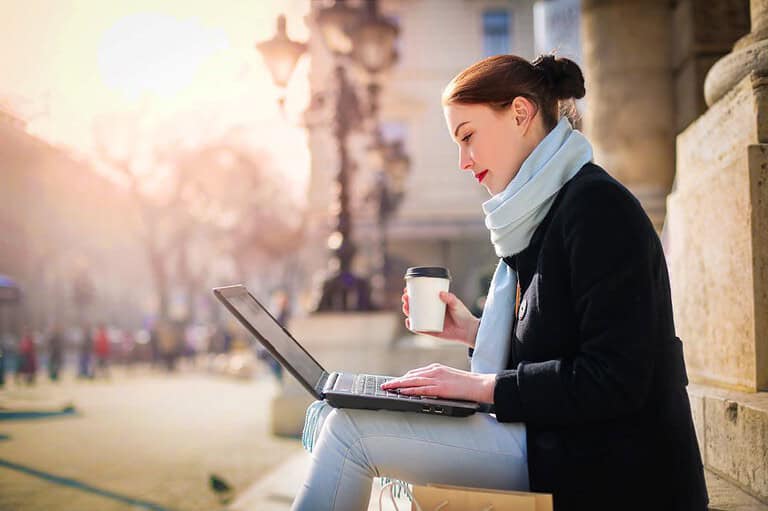

Resources Mentioned in this Episode
Jonathan Hughes: Hello everyone and welcome to the MEFA Podcast. My name is Jonathan Hughes.
Julie Shields-Rutyna: And I’m Julie Shields-Rutyna.
Jonathan Hughes: It’s our first show of the new year, and there’s no better way to start a new year than by talking about the college search, so beginning of the road, so to speak, right? For everybody. This is a show for students who are just beginning to think about where they might want to go to college or what they might want to do. It’s a show of limitless possibilities.
So one of our favorite guests is returning, Drew Carter, who’s the Deputy Director of Admission at Holy Cross. And he’s going to join us to reveal his five secrets for finding the perfect college. So what else do I need to say? You’ll want to hear that. But Julie, who’s on deck before Drew?
Julie Shields-Rutyna: So glad you asked. Well, since Drew will talk about the college search, we thought, why not talk about MEFA Pathway, MEFA’s college and career portal, and all that it has to offer students who are just beginning the college search process. So we’re pleased to welcome back to the show, one of our favorite guests, MEFA Pathway Director, Jennifer Bento-Pinyoun.
Hi Jen. Welcome back to the MEFA Podcast.
Jennifer Bento-Pinyoun: Hi, happy to be here. Thanks for having me.
Jonathan Hughes: Okay, so Jen, so here at MEFA we’re used to having a timeline in our heads for students, you know, and sort of what they might want to be thinking about when, and sharing what students can do each season as they navigate through the college admissions and financial aid process. So we’re used to hearing specific questions about financial aid, for example, from students and their families who are in their senior year of high school. Right.
And then, so we’re used to also having questions about the college admissions process starting in students junior year. Can you tell us when does the college search really begin for students? So who are we talking to?
Jennifer Bento-Pinyoun: Sure. Such a good question. The college search process itself can be very long, and it really is going to be different for each student. Some students may be looking at colleges in their senior year of high school. Some may be starting to look in their freshman year or even earlier than that so that then they have their college list finalized in their junior year.
I think it definitely depends on the student. So MEFA Pathway has offerings for students as young as middle school, and so I think it makes sense to start there. One of the first things that students can do in MEFA Pathway at the middle school level is to take part in fun activities within the discovery zone that highlight Things such as what they like to do, what they’re good at, subjects that they enjoy in school, and where their strengths and interests lie. This can lead them to the college search tools that are available in MEFA Pathway. So students can really start the process of getting to know themselves very early on.
And these activities can be the building blocks of a potential career path. This is different from a defined sort of college search, but knowing your strengths, your interests, your talents, and what you value is really the beginning of the journey, and MEFA Pathway can help with that.
Julie Shields-Rutyna: Oh, that’s so great, Jen. So, okay, so that’s the very beginning of the process and I think, I hope a lot of students can take advantage of that, especially in middle school.
But what about students who are a bit older, high school students? What does MEFA Pathway have to help with those searches for high school students?
Jennifer Bento-Pinyoun: Sure. So we know that when looking at colleges, many factors come into play and some students may have a definite idea of what is important to them early on, but many do not. And MEFA Pathway can help sort through this.
At the high school level, MEFA Pathway has two different ways students can explore colleges. So typically the younger students starts with the Match Me feature that allows a student to go through a number of colorful interactive pages where they select criteria that they would like to apply to their search.
So this includes geographic location. Do they want to stick close to home or go across the country? The size of the college. Do they want to be in a small intimate school or a large school? The setting. Do they want to be in a city or prefer to be in a more suburban setting? They can even add an area of study if they want to narrow down the results even further. Then a list of colleges is generated and based upon that criteria that was selected.
So it can be broad or quite specific based on what the student chooses. From that list of colleges, the student can then click on a school they would like to learn more about. So this brings them to a college details page that is quite extensive, and students can get a good feel if a college may be one they would consider applying to.
So this is why this beginning process is so important. The details pages outline majors and degrees offered, tuition information, special programs, admissions information, student body information, maybe athletics that are offerered at the institution.
Also included is a link to the college’s website. And even a link to the college’s net price calculator. So this is helpful in determining the financial fit of a college. Any colleges that students want to explore further or maybe even consider applying to, these can be saved to their My College List. So this is a great way for students to compile the colleges and then go back to assess those that they will actually apply to later on.
Jonathan Hughes: We’ve talked a lot about college, but I also want to mention that MEFA Pathway isn’t just for college, but it’s for career readiness. Right? So what tools do we have for students who may not be sure that, you know, college is right for them?
Jennifer Bento-Pinyoun: College is not for all students. Every student’s path is different. MEFA Pathway is exceptional in the way that the platform embraces all types of future plans. And students have so many viable, sustainable options, you know, whether that’s pursuing a short-term certification program, starting at a community college and transferring to a four year institution, possibly going into the military, or directly into the workplace.
So MEFA Pathway’s Career Search feature allows the student to generate a list of careers to explore based on a number of different criteria, whether that’s education level, career category. Students can even apply their top interests, values, and skills from the assessments to the search. Similar to the college search, students apply that criteria that’s specific to them to determine the possibility of pursuing a particular direction. And they can create a list of careers that might be of interest.
This can begin at the middle school level within those Discovery Zone features, as I previously mentioned. So the details pages for all the careers offers extensive information where the students can learn more about a career they may want to add to their Careers List for future consideration. This may include ten year projected growth statistics, programs of study needed, education and programs that are required, skills needed, it outlines daily tasks and activities, even related careers.
So another area I’ll mention for students to explore are the four features within our Investigate Your Future. So these features support current and future labor market information where students can view trending skills and occupations in today’s market, growth potential, and geographic concentration of selected careers, all of which can also help students determine the direction they may go in.
Julie Shields-Rutyna: What a great tool. Love MEFA Pathway. So can you talk about how students can take advantage of this? How do they get started with MEFA Pathway?
Jennifer Bento-Pinyoun: Sure. Super easy, quick and easy. MEFA Pathway is available to all students in grades 6 through 12. So students just go onto mefapathway.org and select I’m a student.
And then from there they click on first time user. Where they will be brought to a page where they will put in their name, the state that they live in, and the school that they attend. They do have to create a username and a password and they do have to have a working email address to register. And this is just in case they need to reset their password. And we know this happens.
So they also identify their year of graduation. This is, so the system can provide suggested activities based upon their grade level, which is really cool. So they check off the terms and conditions box, and they’re in. So when they log in, they will see their dashboard, which will help guide them through those suggested activities within the platform.
Jonathan Hughes: All right, Jenn. Well thank you so much. It’s always great to hear about everything that MEFA Pathway is, cause I know it’s always growing and it’s always exciting to hear. Now it’s time to move to the MEFA Mail Bag. So these are questions that have come into us over the past weeks and been answered by our College Planning team.
So remember, if you have any questions, you can email us at [email protected]. You can call us at 1-800-449-MEFA. Or you can reach us over social media. On Facebook that’s mefama. On Twitter, that’s @mefatweets. And on Instagram, that’s mefa_ma.
Our question today comes to us from Matthew who writes, I have a question about how to answer two vague questions on the CSS Profile. Sounds like it’s going to be a good one already. These questions are, “how much did the parent earn from work in 2021” and “how much did the other parent earn from work in 2021?” What do they mean by earn? What exact income do we report? This is such a good representative question from the CSS Profile from parents about the CSS Profile.
So Julie, what should the answer be?
Julie Shields-Rutyna: Yes, and I’m so glad we’re covering this because it seems, especially this year, I personally have received this question often, and I know you have too. It seems like a big one. So I’ll just say that, yes, a lot of people are confused by this. Second, the question is asked on the FAFSA and the CSS Profile. So I think people are confused on both sometimes.
And it comes after people have already put a lot of other income information in there and maybe on the FAFSA, maybe even used the IRS Data Retrieval Tool. So they feel like, “I’ve put my income in there. Why am I now being asked this question in another way?”
So really what this, but just know you’re not doing anything wrong. This is a separate question. And what they’re looking for here is income from work rather than passive income, say from an investment or something like that. So basically they’re looking for the line on the IRS form 1040 line 1, which comes right from the W2. So it’s the W2 income they like and they want and broken out by each parent. So they want that broken out.
And just to get a little more detailed, I’ll go slowly on this to say this. So that’s the main income they want, but here are the other types of income that also should be added in there for each separate parent.
So IRS form 1040 NR line 1A. That’s another type of income that would get added in there. Also, Schedule 1, lines 3 and 6, and Schedule K1, which is IRS form 1065 minus Box 14 Code A. So a lot of people aren’t going to have all of that other information, but so mainly it’s going to be the earned income from your W2. But all of those other pieces, if you have them, can be added in there and again, broken out by each parent separately.
Jonathan Hughes: Julie, thank you very much for that very detailed answer. And one more time. If you have any questions, you can email us [email protected]. Call us at 1-800-449-MEFA. Facebook is mefama. Twitter @mefatweets. Instagram is mefa_ma. Just remember we have a bench of college guidance experts that are waiting to answer your questions for free. So now let’s go to my talk with College of the Holy Cross’s Deputy Director of Admission, Drew Carter, and his five secrets to finding the right school.
Drew Carter is the Deputy Director of Admissions at College of the Holy Cross, and this is his second appearance on the show. Last year, we discussed five things that high school juniors can do to strengthen their college applications. And it was great. So if that topic is relevant to you, you can go back and listen to that on our feed. You’ll see that Drew has great things to say as always and a valuable perspective. So we know we needed Drew to come back to the show and talk to us again. So first of all, Drew, welcome back to the MEFA podcast.
Drew Carter: Thanks Jonathan. It’s great to be here and thanks for reminding me about that prior episode we did on this podcast series. I think actually those two things kind of go hand in hand. They focus on different things, but I hadn’t thought about how the two of them are good, sort of like partner episodes.
Jonathan Hughes: Yeah. Yeah. It was one of my favorite, you know, episodes that we did. So I definitely recommend that everybody go and listen to it. But why don’t you tell the folks what topic we’re going to be discussing today.
Drew Carter: Yeah. So today we’re going talk about five secrets to finding the right college. And these are things that I think sometimes we, in the world of college admissions really understand are really important for students and families looking for the right college.
But sometimes when you’re in the middle of it, it’s hard to recognize what things you should be focused on. So these are my five little secrets, and I say secrets because sometimes they’re not readily available or readily apparent to families going through the process.
Jonathan Hughes: Okay. So right off the bat before we get into the top five, who is this for? So what age or grade, who are we talking to or addressing here with these tips?
Drew Carter: Yeah, I mean these, all of these are messages that I use when talking to 9th graders, 10th graders, 11th graders, and gosh, even sometimes to seniors in as late as December of their senior year.
I think certainly the most appropriate time, the ideal time to hear this message would be, or to be really acting on this message, would be probably during the end of your sophomore year or well through your junior year of high school. But I gave a good portion of this talk to a group of seniors just a couple weeks ago.
There are bits and pieces in here that are great for starting the college search process, but also in a lot of ways, could be very good for making a decision at the very end of the timeline when you’ve got options about schools you’ve been admitted to.
Jonathan Hughes: All right, well, having said all that, let’s go to number one. What do we have?
Drew Carter: So number one is to start with some humility, and I think so often we see students, especially high school sophomores and juniors, and even as early as the start of their senior year, they’re asked so many questions by the adults in their life. Family members, particularly at Thanksgiving, which just happened, guidance counselors, even admissions officers like myself. And these high school students are asked so many questions by these people about college and about their preferences and choices and desires for colleges. And often high school students are filling in answers to these questions where answers maybe don’t yet exist.
And these are questions like, do you wanna go to a big school or a small school? Do you wanna stay near to home or go far away? What do you wanna study when you go to college? And students fill in answers to these questions often I think because they think that they’re supposed to know the answers.
They’re supposed to know the answers because they hear their friends giving answers to these questions, and so many adults are asking them that I think students feel like they’re supposed to know the answers. And so often when answers don’t yet exist, students don’t feel like it’s appropriate that an answer doesn’t exist, so they fill in an answer.
They say, I wanna study political science and I wanna go to a big school. And so my first secret really is for students to own the, I don’t know. And, you know, if I was speaking to parents, I would say really strongly encourage the I don’t know. I don’t know is often the authentic honest answer to some of these questions.
And when students say, I don’t know, they’re giving a piece of information back to the adults in their life, whether it’s family members or guidance counselors or admissions professionals. But I do want to put a stipulation on this. I really encourage students to say, I don’t know if it’s the authentic answer, but you cannot put a period at the end of, I don’t know. When you put a period at the end of, I don’t know, in a conversation like this, adults can sometimes feel like they’ve run into a roadblock.
You know, if your parents and your counselor say, do you wanna go to big school or small school? And you say, I don’t know. Well, what do you wanna study when you go to college? I don’t know. Well, that’s when frustration ensues in the part of the adult. So instead of putting a period at the end of, I don’t know, put a comma at the end of, I don’t know, and then say something that you do know. And I’ll give you an example. So let’s imagine that a guidance counselor or an admissions counselor or even a family member says to a student, well, do you wanna go to a big school or a small school?
If the student doesn’t really know yet, I think they should say, I don’t know, but my cousin is at Clemson, and that’s a really big school, and she likes it, so maybe I would investigate big schools. Or the opposite could be, I don’t know if I wanna go to a big school or a small school, comma, but my English class is my favorite class right now and there’s only 17 students in that class, so I might be more comfortable in a smaller environment.
So what we get there with an answer like that is a student sort of authentically representing themself by saying they don’t know, but then giving some information to the adults, whether it’s family members or counselors or admissions professionals, giving them some information, some insight into their thinking, and that gives them information that they can help that student with and really help advise that student on the next step so they can move that I don’t know to a set of list and preferences and hopes and desires that may develop later in the timeline. So start with human humility. Encourage and own the, I don’t know, and I think you’ll be, students will be set for a much more successful early part of the college search timeline.
Jonathan Hughes: That’s such a good point. I always feel like the luckiest students are the ones who have a good idea of what they wanna study. And, you know, if somebody is lucky enough to have a pronounced interest, like one of the students that I talked to on the show knew that she loved biology and marine biology and really wanted to study that.
And I said, well, that’s, you know, very, very lucky of you to have something that you know you’re interested in and that really can spur you on. But I was very much, you know, in this camp.
Drew Carter: And I think the reality is, like the student you mentioned. Yeah. The student you mentioned, who knows, they wanna study marine bio.
That can sometimes put pressure on the other students who feel like they’re behind in the process if they don’t know. But understand that that student who one day may be so sure of what they think they wanna study may very well change their mind the next day, the next week, the next month. So be open to the, I don’t know, understand that this is a process, and understand that you will embark on a much more successful process if you answer authentically, I don’t know when that’s the authentic answer.
Jonathan Hughes: Okay, so that’s number one. Be open to the, I don’t know. What’s the second tip?
Drew Carter: So the second piece is really kind of a follow up to that first piece, and it’s a follow up to the idea that we as adults are asking so many questions of students. Do you wanna go to a big school or small school? What do you wanna study? Near to home or far away? And I think so often these are presented as binary options to students and they have to choose, I like big schools or small schools. I want to go far away or I wanna stay near the home.
The reality though is that high school students are much more nuanced than that, and the college search process is much more nuanced. It is quite possible that a student could be happy at a big school and a small school. I was the kind of student who was gonna be happy most anywhere. I would’ve been quite comfortable at a large university or a small college.
And so I think it’s important for students to not see the college search options as binary, to be open to the possibility that you be might be comfortable at a big school and a small school. Far away or near to home. And both of those could match with their personality. Now, some students are easily gonna fall into a category where they will only be comfortable in one of the two options, but there’s a great number of students out there who would be comfortable, if not happy, if not thrive, in either of the options that are presented to them.
So I think as adults, we need to shy away from making students choose an option. Big, small, near, far, on campus, off campus. And I think as high school students, high school students really need to be okay with the idea that they could be happy at both options that are presented them when it comes to types of schools or locations or residential environments.
So try not to minimize and make the process, the search process so binary. Be open to the idea that, you know, we’re wonderfully nuanced and complex humans and that it’s really possible that some of us would be happy and thrive in a variety of different environments.
Jonathan Hughes: And so what would you recommend then for students to find out, you know, what are those some of the best ways to find out where you would be happy? Or if you would be happy in both environments?
Drew Carter: Yeah, I mean, I think some of the things that students have found, have done to find themselves most successful is really to provide exposure. And that comes from talking to people, that comes from visiting campuses. There’s lots of different ways that, you know, sometimes I use the example of buying a couch that I did many years ago.
And really, gosh, the only way you start to get a list of your preferences, because when I entered the furniture store, the salesperson said, what kind of couch are you looking? I didn’t know there were kinds of couches, number one, and number two, I didn’t know what the possible options were. What was important for me was just frankly to sit on a whole bunch of couches, and I think for students sometimes that, you know, sitting on couches, the equivalent can be talking to friends or family members, in-person visits, virtual visits, just a variety of different exposures so that you can start to understand what your own preferences might be.
Jonathan Hughes: All right. I remember going to visit my brother at Syracuse University. And big school, you know, and a huge campus basically to me. I know Syracuse is a city outside of it, but it seemed like everything was the university. And I thought, hmm, I don’t think so.
So it was a great opportunity for me to know I wanted to be in a place that had a city around it that wasn’t of the college. And that played a big role in, you know, sort of accumulating my list of schools. So it was very lucky to be able to have that experience. Now number three. Moving on.
Drew Carter: Yeah, so my third one is really to, my third secret is really for families and students to try do their best to avoid minimizing schools into sound bites.
You know, I think, what one of the big challenges that families and students are faced with is that, you know, they start this college search process and with the internet There’s so many schools that are available for your sort of internet consumption. There’s, you know, close to 4,000 4-year colleges and universities in the US and you have to start to understand schools in some ways, and so I think our instinct is to say, oh gosh, Syracuse is the school for communications. And gosh, Emerson is the school just for actors. And this school was just for that. And what we’re trying to do is understand what that school’s like. And I think often we try to minimize schools into sort of like digestible sound bites when the reality is schools are much more complex than that.
And in some ways when I’m saying students are much more complex, colleges and universities are much more complex. There are many students really happy at Syracuse not studying communications. There are wonderful students at Emerson who are not actors who are quite successful and happy.
So to try to avoid this sort of minimizing of colleges and also at the same time to challenge some assumptions. Gosh, my uncle went to Wake Forest and he’s an executive, so everyone there must be interested in business. That’s not necessarily true. That’s a tag I’ve placed onto that college because of what little exposure I’ve had for my uncle who’s an executive.
But the reality is, is that there are many students at Wake Forest studying other things who see other possible careers. Now, this is a little bit of a challenge because I’m saying, dive deeper, learn more, and go beyond some of the sound bites and the assumptions that we’ve built, in a way to really just help us understand colleges.
But I think what we will find is that it’s, because these colleges are much more complex than we’ve assumed, I’m also saying our students are much more complex than we’ve seen. That’s when we really can get closer to fit. Because what you might find is that student looking for a big school who’s not interested in communications but really likes Upstate New York, if they’ve challenged their assumptions, they might end up at Syracuse understanding that it’s not just a school for students interested in studying communications.
Jonathan Hughes: Yeah, I think that’s great, and I think now is the point, cause your first three points really dealt with keeping options open. And sort of broadening your search or broadening your horizons in terms of the colleges that you could be looking at and not limiting yourself. And then I think the question becomes, and I think we get into it in the next tip, is how we then start to go and assess those colleges.
Drew Carter: Yeah. I mean, my fourth secret is exposure matters. And I go back to that example of me going to the furniture store and the salesperson saying, you know, what are you here for? And I said, a couch. And they said, what kind of couch? And I think I pretended I got a phone call on my cell phone because I was uncomfortable.
I, like, I didn’t know. I couldn’t even guess at an answer because I didn’t know the possible answers. But the reality is that by the time I got to the 12th or 13th furniture store and I walked in and they said, what are you here for? And I said, a couch. And they said, what kind of couch? I said, well, 94 inches. I want Cord Royal. I want the Chase reversible option. I went the extra cushion and I want the piping on the sides.
And the only reason I knew all those things about myself, and I knew about all the possible answers was I’d been willing to be clueless. I’d been okay with the not knowing. And I had been willing to just sit on a ton of couches and, you know, for the college search experience, the good news is that there’s so many new ways now to provide this sort of experience.
You know, reading about couches isn’t that successful. You really kind of need to sit on them. And for colleges, I think there is things to learn. There are things to learn online from virtual tours and webinars and gosh, email correspondence, whether it’s with admissions professionals or with current students.
And there’s certainly a lot of ways where you can learn about schools in person, whether it’s an official campus visit with a tour or an information session, maybe an open house program. But sometimes, you know, I think we place such a high priority on these official visits. I think we overlook sometimes just the, you know, sometimes you’re just on the way home from grandma’s house and you’re on the highway and you see a sign that says, this college, this exit, and you just get off and drive around and walk around for 10 minutes.
All of that exposure matters. Sometimes it’s about learning about that particular college. But remember as a student in the college search process, you are learning about yourself just as much, if not more. You have to build that sort of vocabulary and set a lists of preferences for yourself, and the unsuccessful visit can do as much toward moving you in the direction of a perfect college or fit college or dream college as the successful visit.
Sometimes you don’t know what kind of couch you want till you sit on the couch that you don’t want. And so while I want a job in admissions, I want you to come to the official campus tours, be open to the quick drive, by the 10 minute walk around, the self-visit on a Sunday afternoon on the way home from a theater performance or a lacrosse game.
Those matter too. All this exposure is just accumulating and going toward developing a vocabulary and a set of list and preferences. So exposure matters and look forward in all ways, both online, in-person, official, and unofficial.
Jonathan Hughes: All right, so let’s wrap it up at the final tip.
Drew Carter: All right. So we often see students coming to campus for that official visit, right, that campus tour.
And not too long ago, I came up into our main office, main admission office at Holy Cross, and I saw a group of families waiting in line, waiting to talk to our receptionist who happened to be on the phone at the time. And so I jumped in just to see if there’s any way I could help.
And you know, lots of them had copies of the Boston Globe and the New York Times that they had come to campus with that day. And most of the families had just gone on the campus tour, and they were looking for recommendations for a great place to eat off campus in Worcester. And we’ve got great restaurants in Worcester, and I had many recommendations for them.
But my fifth secret is this, if you’ve spent the time to travel to that campus to visit, eat the food on campus and read the student newspaper. In those two small experiences, you’ll learn more about student life than you did on the website, on the campus tour, or the information session. And I say that because, not necessarily because the food matters. Gosh, I think food at every college right now is great.
The food, the level of food on college university campuses is just so high right now, so I don’t really think the food matters so much, but that when you go to a place on a college campus where food is served to college students, what you see is the announcements for the clubs and activities that weekend.
You see the signups for intramural volleyball. You see the way students are talking to each other. You witness living and breathing student life. It is like going into the lions cage at the zoo. You get a real experience to be an observer inside the moment. And I think you learn more from eating that muffin and drinking that smoothie at the coffee shop in the student center.
You learn more about student life in those few moments than you necessarily might from a campus tour or an information session. And that second piece, you know, in the admissions world, we’re gonna hand you the glossy brochures. Most of which are written by you know, marketing companies, we’re gonna mail ’em to you.
But the reality is, is that the student newspaper at each college and university, those are college students talking to each other about the things that matter to them on their campus. So if you make the time to visit a college campus, I strongly encourage you to make the time to eat the food while you’re there and to read the student newspaper.
That’s where you get true insight into what student life is.
Jonathan Hughes: If you’re talking with somebody right at the very beginning of this process, what’s a good place for them to start their search? And then one more question too, which is, if you’re the parent of a child who doesn’t know the answers to the questions of what kind of school do you wanna go to, where do you wanna go, what do you wanna study, etc. What’s the best thing that you can do>
Drew Carter: Okay, let me start with that second one first. Right, cause it can be frustrating as adults when we keep asking our teenagers questions and their response is, I don’t know. I don’t know. So two pieces of advice for those parents.
First, encourage them to put a comma at the end of that, I don’t know. And then to say something they do know. But also, this is this gonna sound strange cause I’m a parent as well, but stop asking so many questions early in the timeline and just encourage and to help provide exposure, get your children sitting on couches. Provide them the exposure so that they can start to understand all of the options and that what their taste and preferences might be.
Remember, we’re asking students for what their preferences are in an experience they’ve never had before. Imagine a student who’s never driven a car, has only ridden a bike. And we say, what’s your favorite kind of car? So we need to get them to provide them exposure, so fewer questions by the parents early in the timeline and assist with the exposure.
And your first question was really about how to start, you know, to a student who’s in 9th or 10th grade. I will say that I do a lot of interviews throughout the fall and early part of the winter with high school seniors, and one question I ask every student is, what advice would you give to a student just starting the college search process, knowing what you know now. I’ve asked that question for about 18 or 19 years now, and I’ve only gotten one answer in response.
Every single student who’ve I’ve ever asked, thousands of students has always said, I wish I started visiting schools earlier. I think families so often hesitate because they say, well, I don’t know where my child could get in. I don’t know what’s a good school or not. We don’t have, and I just, I think so often we’re putting the cart before the horse.
Let’s just see this as exposure and not necessarily worry about what schools you’re looking at or what schools you’ve decided to do a quick visit. I say like, find the closest college and do a 20 minute walk around. It’s not necessarily to determine if that school’s right for your child in 9th or 10th grade.
It’s to start to give your child exposure to the college environment so they can start to build up that vocabulary and start to develop a list of preferences. It’s just another couch they’re sitting on so that they can over time, accumulate enough visits, enough sits, that they can identify their own preferences.
Cause this is as much a sort of a self discovery as it is college and university discovery.
Jonathan Hughes: Well, that’s great. I’m not sure I can do better than that. I know when I was a student in high school, I had no problem sitting on couches, so that was good for me. But Drew, thank you so much. I really enjoyed this yet again, and I can’t wait to have you back for a third time.
Drew Carter: Thanks, Jonathan. Good luck to everybody in this college search period of time. And this can be, I think, a period of time with great discovery, but also great enjoyment and great fun. So I think the more we can keep this as a fun period of time, the more buy-in we’ll get from our high school students.
Jonathan Hughes: I agree. Thanks so much Drew. All right folks. Well, that about wraps it up for us. Jennifer Bento-Pinyoun, thank you for being here with us.
Jennifer Bento-Pinyoun: Thanks for having me.
Jonathan Hughes: I wanna thank Drew Carter for sharing his time and his expertise with us. And folks, remember, if you liked what you heard today and you wanna know more about planning, saving, and paying for college and career readiness, you can follow us on Apple Podcasts, Spotify, Stitcher, wherever you get your podcast. And please remember to review us. It helps us to keep doing what we are doing and getting this show out to folks like you. So Julie, thank you once again.
Julie Shields-Rutyna: Thank you, Jonathan.
Jonathan Hughes: I also wanna thank Shaun Connolly, our producer, and AJ Yee for his assistance in posting the show.
And once again, my name is Jonathan Hughes and this has been the MEFA Podcast. Thanks.













